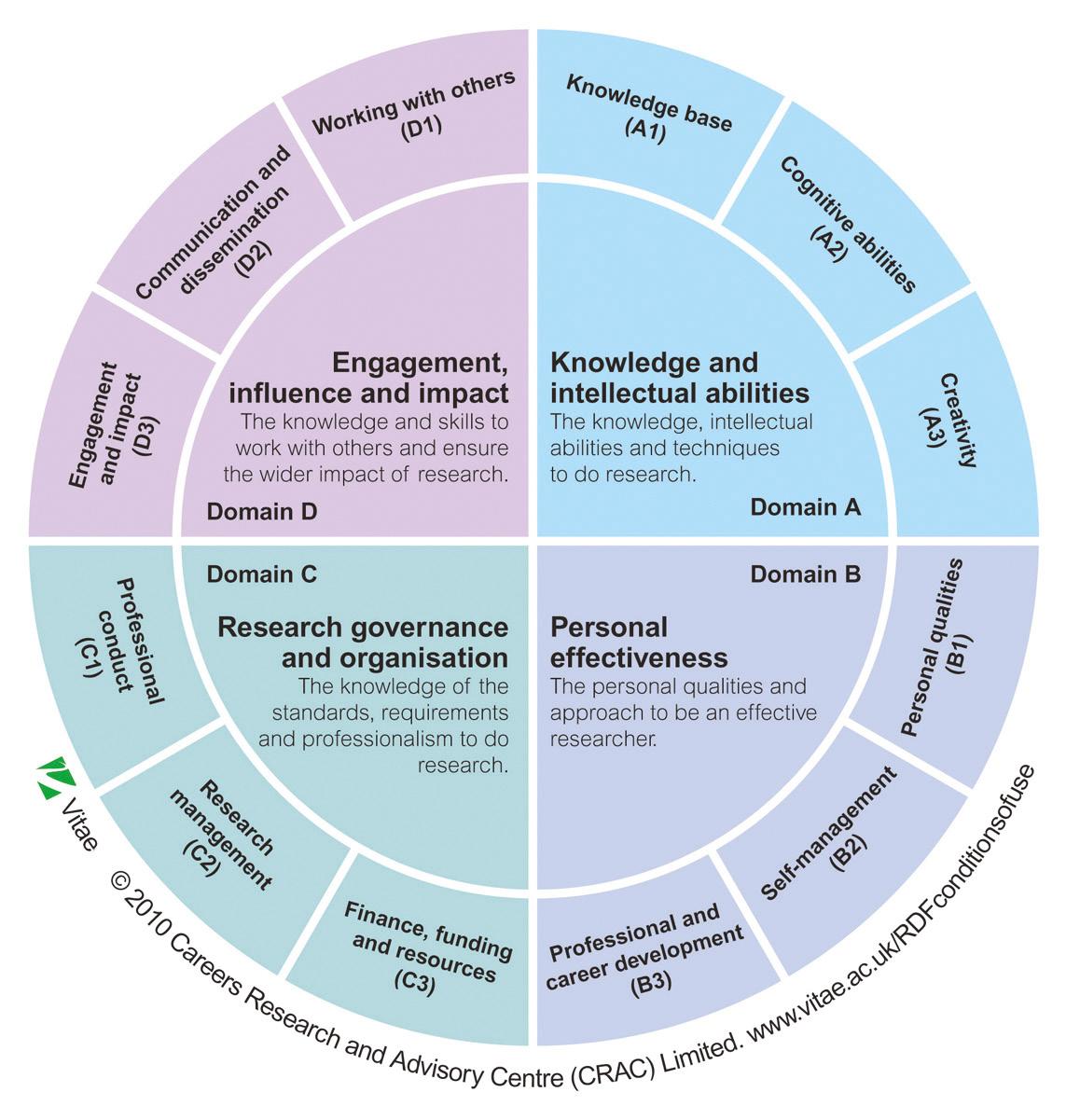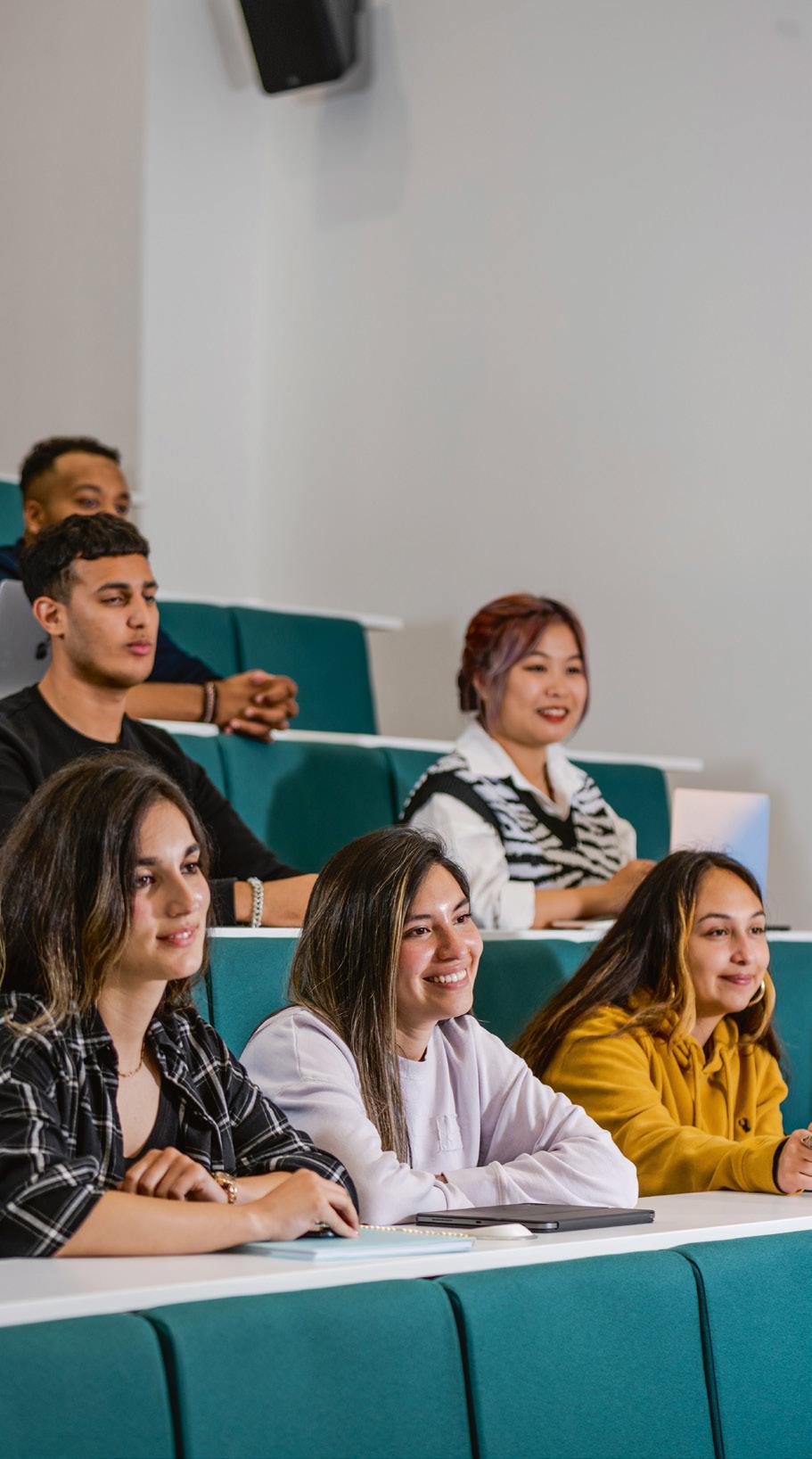

I would like to take the opportunity to thank all the staff who offer their expertise and time to deliver on the programme.




I would like to take the opportunity to thank all the staff who offer their expertise and time to deliver on the programme.

Welcome to the 2024-25 Researcher Development Programme (RDP) brochure for our postgraduate research community. This brochure outlines a range of researcher development opportunities and resources available to you, making up an integral element of our research degree programmes and research culture here at BU.
The RDP is complementary to your research degree and offers you flexibility to develop your academic and research skills during your journey, irrespective of degree or study mode. You can pick and choose which workshops, resources and events to engage with throughout your research degree. You have a growing range of resources available to you which we hope you will find valuable.
We wish you an enjoyable year. Please feel free to contact your postgraduate researcher development, culture and community team if you have any questions: pgrskillsdevelopment@bournemouth.ac.uk.
Enrica Conrotto Doctoral College
Programme Manager
Arabella
Moyse Doctoral College Marketing & Events Coordinator
Researcher Development Framework (RDF)
The Researcher Development Programme suite of workshops, webinars and masterclasses are mapped against the 12 sub-domains of the national Vitae Researcher Development Framework (RDF) – shown right.
“The RDF is a professional development framework for planning, promoting and supporting the personal, professional and career development of researchers in higher education. It articulates the knowledge, behaviours and attributes of successful researchers and encourages them to realise their potential.” Vitae®, 2010 Careers Research and Advisory Centre (CRAC) Limited.

The RDF is useful when building on your current strengths, and considering the skills and experiences to enhance. It can be used to guide conversations with your supervisory team on your development journey, assist in setting goals and creating an action plan to becoming a well-rounded researcher. The RDF can
Access a larger visual overview of the RDF on the Vitae website: vitae.co.uk Subscribe to the Vitae website using your @bournemouth.ac.uk email for free access to their resources.
help with articulating your skills and attributes in a language an employer will recognise on your CV, job applications and during interviews.
The RDP consists of workshops and webinars, masterclass skill sessions, and online resources designed to support your independent learning and progress. Content is primarily produced and delivered by BU academic and professional services staff, as well as some external facilitators ( ) highly regarded in supporting postgraduate researchers.
Different opportunities will be suitable for you at different stages, for your ease, workshops have been aligned with broad research degree stages (early, mid, final or all, p.14-15). These are only suggestions as you may be ready to engage with areas earlier or later than anticipated.
Early: Full-time: Year 1 | Part-time: Years 1-2.
Mid: Full-time: Year 2 | Part-time: Years 2-4.
Final: Full-time: Year 3 | Part-time: Years 4-5.
It is important to consider the skills you could need for the next stage of your research. Many sessions may only be delivered once per academic year, so planning ahead is required. For Masters students this is even more important as your time frame is much shorter.
It is encouraged, in collaboration with your supervisory team, that you undertake an annual DNA to recognise your strengths and areas for development.
This can be used by yourself to monitor your development and uploaded as part of your Annual Review. Your DNA can be a personal record of progress, backed up by evidence.
Once you have identified some gaps in your skills, or an area where skills could be enhanced, identify which workshops, resources or event can best address your needs. To help with this, the RDP and DNA mirror the RDF sub-domains as highlighted on p.4.
A DNA template can be found on the RDP Brightspace unit: brightspace.bournemouth.ac.uk/d2l/home/25425
You can feedback on all aspects of the RDP via the anonymous online feedback form in the Brightspace RDP unit under ‘We’d Love Your Feedback’. You will also receive an email inviting you to feedback after any RDP session attended, this helps maintain the quality, nature and direction of the programme.
Faith and reflection and the team of chaplains and faith advisors offer confidential and non-judgemental support, guidance, prayer and a listening ear, regardless of whether you have faith or not. www.bournemouth.ac.uk/students/health-wellbeing/faith-reflection
Me@BU is home to a dedicated self-care toolkit providing you with useful advice and resources to support you in managing your wellbeing during your time at BU: brightspace.bournemouth.ac.uk/d2l/le/content/25416/ viewContent/523502/View
SportBU is great if you are looking to get active. They have a range of exercise classes for all levels, a well-equipped gym and professional guidance from their friendly staff: microsites.bournemouth.ac.uk/sportbu
Student Wellbeing provide extensive guidance to all BU students whether you are looking for academic, career, financial or wellbeing support, advice is available: www.bournemouth.ac.uk/students/health-wellbeing
The Wellbeing Thesis is an online resource for postgraduate researchers to support your wellbeing, learning and research: www.thewellbeingthesis.org.uk

While the RDP is a bespoke programme for postgraduate researchers, please also consider the wider range of support and sources of information available to you throughout BU.
Additional Learning Support is available to all BU students, on or off campus. If you have a condition which is likely to affect your personal learning, please do not hesitate to get in touch with this supportive team: www.bournemouth.ac.uk/why-bu/student-wellbeing/additional-learning-support
Brightspace is our Virtual Learning Environment. On here you have access to a huge range of additional resources, information, communities and support. Log on using your student email and password and explore what’s available to you: brightspace.bournemouth.ac.uk
CareersBU can provide individual support for your career now and after graduation. Further information here: https://www. bournemouth.ac.uk/students/help-advice/looking-support/careersbu-support
Doctoral College Brightspace Community aims to make finding information and support relating to postgraduate research easier for you. With details on key contacts, policies, student support, events and much more, check it out: brightspace.bournemouth.ac.uk/d2l/home/25416
The IT Learning Centre offers a broad range of digital skills training and statistical support. They have a one-to-one support system and a drop-in service. Find out about their extensive service: brightspace.bournemouth.ac.uk/d2l/home/18313
Languages@BU is a free service offering the opportunity to independently learn a new language from scratch or brush up existing skills including English language: brightspace.bournemouth.ac.uk/d2l/home/141283

The Early Career Researcher Network (ECRN) is for all researchers who are, or who feel they are, at the beginning or in the early stages of their research career. The network was established to bring researchers together, to make connections and to provide support, and to facilitate collaboration on research projects. The network has a monthly meeting with a great line-up of events and networking opportunities, offering general advice and support as well as tailored workshops for skills training and career development.
To join the network, email RKEDF@bournemouth.ac.uk and you can follow ECRN updates on the BU Research Blog: blogs.bournemouth.ac.uk/research/category/ecr-network/
The Public Engagement with Research (PER) Network at BU facilitates learning, networking and the sharing of best practice around engaging the public with research.
You can keep up to date with the latest news and information, including funding opportunities, resources and training sessions through our Microsoft Teams area.
Search ‘Public Engagement with Research Network’ on Teams or use the Microsoft Team code w8lxz07.

PGR Reps volunteer their time and are elected by their peers to help make University life the best it can be by collecting feedback from their PGR colleagues, representing these views with the University and SUBU and sharing what’s happened as a result of giving this feedback.
If you would like to find out more about what’s involved in being a PGR Rep visit the SUBU website: www.subu.org.uk/represented.
For details on your department PGR Reps, please visit Student Voice on the Doctoral College Brightspace community: brightspace.bournemouth.ac.uk/d2l/home/25416.
The BU Postgraduate Society is peer-led and offers a space for BU PGRs to develop, collaborate, have fun and learn from each other in a relaxed and social environment to build a community of word-class researchers.
For more details and how to join visit: www.subu.org.uk/organisation/pgrsoc/
The Doctoral College deliver a long induction schedule which spans the duration of your research degree to ensure you have appropriate and timely information at key transition points.
This induction for new PGRs is complementary to your faculty welcome for new PGRs and provides you with information to get started on your research degree with us. You’ll also find out about the support services and opportunities available to you during your time at BU.
This is an opportunity to meet and network with your PGR community.
If you have not attended an induction please contact the PGR Admissions Team: pgradmissions@bournemouth. ac.uk and they can invite you to the next event.
This annual re-orientation is an opportunity for PGRs approaching their Major Review to hear about updates including those in the RDP and wider BU services.
You will be able to consider research ethics at this mid-point stage and there will be a bite-sized milestone preparation for the Major Review.
If you are unable to attend this re-orientation you may wish to look at the full milestone preparation: Major Review workshop (p. 26).
This annual re-orientation is an opportunity for PGRs approaching their Viva Voce examination to hear about updates including those in the RDP and wider BU services.
You will be able to consider research ethics and data management and what this means towards the end of your research degree. There will be a bitesized milestone preparation for the Viva Voce examination.
If you are unable to attend this re-orientation you may wish to look at the full milestone preparation: Viva Voce examination workshop (p. 26).

Are you looking for an opportunity to become involved in the wider research community and discuss your research with other researchers?
The Annual Postgraduate Research Conference provides all BU PGRs the opportunity to disseminate and discuss your research via various platforms including oral and poster presentations during this interdisciplinary event.
While the conference is formal, it takes place in a relaxed and supportive environment providing the perfect opportunity to develop presentation, communication and networking skills. The call for abstracts is a competitive process, however we endeavour to display as many submissions as possible. The Postgraduate Research Showcase is a further opportunity to exhibit your posters within the wider BU community, while the Virtual Exhibition will be available throughout the year.
These events bring together your PGR community and support a positive research culture, whilst developing your research and transferable skills. So, whether you will be presenting, or attending as a delegate, we look forward to welcoming you all at the next Annual Postgraduate Research Conference.
If you are using any fantastic online resources for your researcher development please let us know so we can share them on Brightspace.

You will find links to an expanding and evolving range of free online learning materials including e-learning, videos, podcasts and external resources on the RDP Brightspace unit under ‘Online Resources’.
Workshops where we have online modules with associated content are highlighted with this icon. These modules make up the Epigeum Research Skills Toolkit which you can access by following the instructions under ‘Online Resources’ on the RDP Brightspace unit.
If you are unable to attend either Talbot or Lansdowne in person, or find it difficult because of work or caring commitments, we are now offering most workshops in a webinar format.
Webinars are indicated with this icon throughout the brochure. Booking is still required via Brightspace and will close ten minutes before the session starts. Details on how to access the webinar will be sent to you in your Eventbrite confirmation and reminder emails. Please take care entering your email address when registering as this is where the webinar details will be sent.
Step 1
Log on to Brightspace
Step 2
Find Doctoral College: Researcher Development Programme
It is important you take responsibility when booking and attending sessions. Please consider the following:
• Arriving late: Unless pre-arranged, arriving late is not permitted and non-attendance will be recorded.
If you require any reasonable adjustments to enable you to fully participate in RDP sessions, please highlight these on the Eventbrite order booking form for our attention. Please note we will likely need to disclose this to the session facilitator to best support you.
Step 3
Click ‘workshops, webinars & masterclasses’ in quick links
Step 4
Find session using the ‘search topics’ function or by scrolling down
Step 5
Select the session, click on the date under ‘Register Here’ and follow the Eventbrite instructions.
• Non-attendance: If you have booked onto a session and can no longer attend or have changed your mind, please cancel your booking, providing at least 24-hours notice.
Step 1: Log in to Eventbrite.
Step 2: Go to ‘manage order’ and select cancel.
Or email us and we can cancel for you: pgrskillsdevelopment@ bournemouth.ac.uk.
Attendance will be recorded and data shared with the Faculty upon request. In accordance with the Concordat to Support the Career Development of Researchers, Researchers must engage in a minimum of 10 days (70 hours) professional development pro rata per year. How this looks will be individual to your needs.
We can provide a certificate of recognition if you have engaged in researcher development managed by the RDP.
16 Careers: Applying your skills outside academia
16 Careers: Understanding and planning for a research career
17 Creating an academic poster
18 Critical appraisal of qualitative research papers
18 Critical appraisal of quantitative research papers
19 Demonstrating research impact
19 Developing a search strategy
20 EndNote desktop as a research tool
21 Ethics: Clinical research governance
21 Ethics: Values, standards & BU process
22 Figures, images & visualising information
22 Imposter syndrome
23 Integrating GenAI in Postgraduate Research
23 Intellectual property and your research
24 Introduction to education practice for PGRs
25 Managing your research project
25 Methodology 1: What is methodology?
25 Methodology 2: Methods chapter
26 Milestone preparation: Probationary Review
26 Milestone preparation: Major Review
26 Milestone preparation: Viva Voce examination
27 NVivo: Setting up a database & analysing data
27 Originality & plagiarism in research
28 Planning & writing your thesis
28 Planning & writing your integrated thesis
29 Presentation skills for researchers
29 Problem solving & creative thinking
30 Productive writing: Techniques, planning and finishing
31 Publishing your research
31 Quantitative statistical analysis (using SPSS)
32 Research data management: An introduction
32 Reflexivity in research
33 Research design: Action research & ethnography
33 Research design: Case study research
34 Research design: Mixed-methods research
35 Research methods: An introduction to qualitative research
35 Research methods: An introduction to quantitative research
36 Research methods: Content analysis
36 Research methods: Discourse analysis
37 Research methods: Focus groups
37 Research methods: Interviewing in semi-structured interviews
38 Research methods: Transcribing - The Conversation Analytic Approach
38 Research methods: Social media
39 Research methods: Surveys & questionnaires
39 Research methods: Visual content analysis
40 Research philosophy: An introduction
40 Social Media for Research
41 Thesis Writing Bootcamp 41 Thematic coding 42 Working with your supervisors
42 Writing your literature review
• Understand your transferable skills and how to communicate these on your CV and in an interview situation.
• Understand how to present yourself and be visible online.
• Have an overview of a range of non-academic career options.
• Have an overview of research careers and what is expected of early career researchers.
• Understand the next steps that you can take to enhance your career prospects.
• Understand the skills you have and those that you would like to develop further.
Beyond Research: Career Planning
Beyond Research: Career Planning
Updated for 2024-25
• Understand the context and features of an academic poster.
• Understand the design features and underlying concepts.
• Understand the appropriate use of visual materials.
• Understand techniques related to creating flow and impact for posters.
• Unlock the secrets to writing a compelling abstract that will get your poster accepted.
Disseminating your research: Communicating your research with impact
Thinking about submitting a poster to the Annual PGR Conference?
Why not pop along to this session for some tips from a previous conference poster winner?
See page 11 for more details on the Annual PGR Conference.

• Understand principles of critically appraising qualitative research papers.
• Appraise the quality of each section of a qualitative research paper in relation to the purpose of that section and evaluate the overall strengths and weaknesses of the paper.
• Assess the relevance of research papers to your own research and literature reviews.
• Understand principles of critically appraising quantitative research papers.
• Appraise the quality of each section of a quantitative research paper in relation to the purpose of that section and evaluate the overall strengths and weaknesses of the paper.
• Assess the relevance of research papers to your own research and literature reviews.
Research methods: Undertaking a literature review
Research methods: Undertaking a literature review
Need a little help searching for literature to critique?
Don’t worry, help is available.
Why not attend a ‘developing a search strategy’ session (page 19), check out the ‘finding information’ library guide (libguides. bournemouth.ac.uk/finding-information), or make a one-to-one appointment with your Faculty Librarian (page 31).
• Understand what is meant by impact, why it is increasingly important and the pathways to achieving it.
• Gain insights into the perspective of research funders on impact.
• Identify the different types of impact, through a series of concrete examples.
• Think about planning an impact strategy, in the context of your own research.
Disseminating your research: Communicating your research with impact
Disseminating your research: Getting published
• Use and access BU Library resources.
• Learn the fundamentals of database searching using advanced database searching.
• Receive an overview of BU’s Library resources in your subject area.
• Receive an introduction to citation tracking using Web of Science and Scopus databases.
• Discover how to make interlibrary loan requests for papers BU doesn’t have access to.
Research methods: Undertaking a literature review
You can explore the ‘finding information’ library guide: libguides.bournemouth.ac.uk/finding-information (website), and also make a one-to-one appointment with your Faculty Librarian (page 31) who is happy to help.
Your Faculty Library Team is always available to help you regarding library resources, finding information, clarification about thesis submission, copyright and other queries you may have.
Contact them using the mailboxes below:
BU Business School
bubslibteam@bournemouth.ac.uk
Faculty of Health & Social Sciences hsslibteam@bournemouth.ac.uk
Faculty of Media & Communication fmclibteam@bournemouth.ac.uk
Faculty of Science & Technology scitechlibteam@bournemouth.ac.uk

• Understand how to build a library of references.
• Learn how to manage your search results using EndNote.
• Learn how to create citations and build a reference as you write with Word.
Research methods: Undertaking a literature review
Can’t attend this session or looking for follow up materials?
Check out the ‘EndNote’ library guide libguides.bournemouth.ac.uk/endnotedeskstop.
Intended Learning Outcomes
• Understand different types of clinical research and organisation involved.
• Understand what clinical research governance is, and its importance.
• Understand the process and requirements for gaining compulsory external approvals.
• Know about wider training on offer.
Ethical research: Becoming an ethical researcher
Ethical research: Research ethics in practice
Intended Learning Outcomes
• Understand research ethics and ethical principles and conduct.
• Understand the practical elements and procedures involved in good ethical practice in research.
• Understand the process of gaining ethical approval at BU.
Ethical research: Becoming an ethical researcher
Ethical research: Research ethics in practice
All PGRs must receive ethical approval before data collection.
For more information on what this is and any questions please email researchethics@bournemouth.ac.uk.
For more information on research ethics, governance and integrity visit: www.bournemouth.ac.uk/research/research-environment/research-governance-integrity
• Introduction to the principles of good information visualisation.
• Overview of various types of visualisations and how you can represent your work visually
Please note: This is not a workshop on how to use software tools, although a list of tools will be provided for participants to explore on their own.
• Be able to define and identify Imposter Syndrome.
• Imposter Syndrome and its effects.
• Identify strategies for overcoming Imposter Syndrome.

for 2024-25
for 2024-25
• Understand the potential applications of GenAI in diverse research domains.
• Identify suitable GenAI tools for your specific research projects.
• Gain hands-on experience in implementing basic GenAI tools.
• Develop a roadmap for incorporating GenAI into your research methodologies
• Understand the key concepts within intellectual property law relating to academic research, being copyright, trade mark, patent and design rights.
• Explain how intellectual property relates to academic research, considering your own intellectual property, and the intellectual property of others.
• Apply this knowledge, in developing best practices to maximise your own intellectual property protection and any potential commercialisation.
• Understand a variety of effective learning and teaching styles.
• Appreciate the differences between teaching/engaging small cohorts and large cohorts.
• Feel confident with regard to undertaking assessments and providing feedback.
• Integrate learning technologies within your teaching.
• Plan and execute your own teaching sessions.


Teaching is recognised as a valuable part of development as a PGR but teaching commitments should not be so onerous that they detract from the research. In line with Research Councils, the total time spent (including preparation and marking) should not exceed six hours in any week during semester time.
The provision of teaching is the responsibility of the Faculties, and is paid for at the normal BU rate.
PGRs who wish to teach must first complete the entire BU Introduction to Education Practice for PGRs, which is run by Centre for Fusion Learning Innovation and Excellence (FLIE).
Full details are given in the Guidelines: Employment of Postgraduate Researchers (PGRs) for Teaching or Demonstrating Duties.
Extract from the Code of Practice for Research Degrees 2024-25
• Understand why project management is important for PGRs.
• Experience the use of relevant project management tools within a research context.
• Explore how to identify and manage project risks.
• Understand how to plan your research to improve your chances of completing on time.
• Examine the overall view of methodology.
• Decipher the differences between key research terms.
• Start to develop a research framework.
Intended
• Define the main constituent parts of a research chapter.
• Explore possible research approaches for your study.
• Gain an overview of research design.
Milestone preparation:
Probationary Review
• Understand the purpose of the Probationary Review.
• Have confidence preparing for your Probationary Review.
• Understand the wider process in relation to your research.
• Understand how to submit your Probationary Review.
Milestone preparation: Major Review
Milestone preparation: Viva Voce examination
Collect your current Code of Practice for Research Degrees from your faculty-based Postgraduate Research Administrators or Doctoral College office.
• Understand the purpose of the Major Review.
• Have confidence preparing for your Major Review.
• Have awareness of the role of the independent academics.
• Have appreciation of the role of the supervisory team in the process.
• Understand how to submit your Major Review.
• Understand the purpose of a Viva Voce examination.
• Understand the process for thesis submission, Viva Voce examination and completion.
• Plan the steps you might take in preparing for your Viva Voce examination.
Unable to attend a milestone preparation session?
There is another opportunity to receive this information, at our annual re-orientations. See page 10 for more information.
• Understand advantages and limitations of using computer software for qualitative data analysis.
• Set up a database, import and code data.
• Understand the potential of NVivo tools for organising, questioning, interrogating and reporting on data.
• Understand the capabilities of NVivo in the context of coding, retrieval, analysis and reporting on primary research data.
• Understand why plagiarism is more common in postgraduate research work.
• Learn how to check the originality of your work and to reference consistently and well.
• Learn about the importance of copyright and receiving 3rd party permissions so your work can be published.
• Understand why Open Access is vital.
Disseminating your research: Getting published
After attending both full days you will enjoy free and unlimited, online, one-to-one support for the life of your first project using NVivo.
Book an appointment with your Faculty Librarian for one-to-one support on copyrights and referencing. See page 20 for details.
Planning & writing your thesis
Planning & writing your integrated thesis
• Understand the generic ‘logical’ thesis structure and potential chapter contents.
• Know how style of writing differs according to research types.
• Recognise the importance of organising communication and feedback from your supervisors.
• Know what to consider when deciding whether your thesis is ready for submission and what examiners are evaluating.
• Understand how to create a coherent thesis using the integrated thesis format.
• Understand the importance of copyrights and avoiding plagiarism.
• Understand the multi-layered relationship with supervisors in the integrated thesis and how to manage this.
• Know what to consider when deciding whether your integrated thesis is ready for submission and what examiners are evaluating.
Want some tips formatting your large word document? The IT Learning Centre are available to help. ITLearningCentre@bournemouth.ac.uk.
Looking for specific advice around copyrights in your integrated thesis?
Book a one-to-one with your Faculty Librarian. See page 20 for details.
• Be introduced to a series of techniques to aid and structure your presentations.
• Have an understanding of how to present and engage with various audiences.
• Gain confidence with regard to delivering effective presentations.
Disseminating your research: Communicating your research with impact
• See the first step to solving a problem is to ask the right questions.
• Use a range of techniques for stimulating creative processes.
• Develop techniques to generate ideas and select solutions.
• Access resources for creative thinking, problem solving and decision making.
Research methods: Principles of research methods
Why not show off your new skills at the Annual PGR Conference?
See page 11 for more details.
• Be introduced to a range of writing productivity techniques.
• Plan out a manuscript from scratch.
• Discuss various writing challenges with your peers.
• Initiate a work plan and set deadlines for your writing.

your research
• Select appropriate elements of a thesis for publication or formulate an idea and question.
• Identify core journals and publication outlets for your work.
• Recognise appropriate methods of writing for publication.
• Adhere to ethical publication guidelines on authorship.
Please bring along your own research abstract to this session.
Disseminating your research: Getting published
Session 1: Introduction to statistical analysis.
Session 2: Managing and manipulating data.
Session 3: Introduction to null hypothesis significance testing.
Session 4: T-tests.
Session 5: ANOVA.
Session 6: Correlation and regression.
Session 7: Non-parametric testing A.
Session 8: Non-parametric testing B.
Advanced Statistical Analysis
Session 9: Principle component analysis and exploratory factor analysis.
Session 10: Discriminant function analysis.
Session 11: Binary logistic regression.
For full session details visit the RDP on Brightspace and search ‘SPSS’:
brightspace.bournemouth.ac.uk/d2l/home/25425
• Describe the benefits of good research data management.
• Consider and select appropriate information to include in a Research Data Management Plan.
• Use online tools including DMPonline and BORDaR to support good research data management practice.
Research methods: Principles of research methods
• The role our values play in all stages of the research process.
• The potential prejudices of the researcher and importance of ‘being honest with yourself’.
• The internal vs external researcher – advantages and limitations.
• Ways to minimize researcher’s bias when studying a phenomenon as a ‘native’ researcher and how not to be compromised by the assumption of ‘being one of us’.
• Understand the principles and processes involved in action research and ethnography.
• Assess the merits of the two methodologies and when each would be fit for purpose.
• Evaluate the ethical considerations at work in each methodology.
• Consider the efficacy of each methodology for a range of research context and objectives.
• Understand key characteristics of case study approaches to research.
• Understand what makes a convincing case study.
• Evaluate whether case study approaches are applicable in your own research.
Research methods: Principles of research methods
Research methods: Arts and humanities
Research methods: Social science
Research methods: Principles of research methods
Research methods: Arts and humanities
Research methods: Social science
Updated for 2024-25
• Explore the philosophical debates surrounding the design and development of mixed-methods research.
• Discover multiple rationales for conducting mixed-methods research.
• Develop an understanding of the practical strategies for conducting mixed-methods research.
• Discuss the methodological challenges associated with using mixed-methods and if a mixed-methods approach might be suitable for your research.
Research methods: Principles of research methods
Research methods: Arts and humanities
Research methods: Social science
Research methods: STEM

• Identify the key assumptions underpinning qualitative research.
• Identify different methodologies which can be used in qualitative research.
• Recognise the role of the researcher in qualitative research.
• Have an awareness of the criteria for rigour in qualitative research.
• Formulate a research question and understand aims and objectives.
• Identify the main types of quantitative research design and appropriateness to answer research questions.
• Recognise appropriate methods to present types of data.
• Understand the stages in statistical testing and which tests are appropriate to use.
Research methods: Principles of research methods
Research methods: Arts and humanities
Research methods: Social science
Research methods: STEM
Research methods: Principles of research methods
Research methods: Arts and humanities
Research methods: Social science
Research methods: STEM
• Understand the basics of content analysis as a method: in what contexts it is applied and when it is appropriate.
• Understand how coding categories are developed.
• Develop your own coding manual for content analysis.
• Perform your own intercoder reliability tests.
• Understand the variety of discourse analysis approaches.
• Get insights into French and critical discourse analysis as types of discourse analysis.
• Identify the benefits and limits of discourse analysis.
• Apply French and critical discourse analysis to different corpora – political speeches, media articles, videos.
Research methods: Principles of research methods
Research methods: Arts and humanities
Research methods: Social science
Research methods: Principles of research methods
Research methods: Arts and humanities
Research methods: Social science
• Outline key skills of a focus group facilitator.
• Identify when focus group discussions would be an appropriate data collection tool.
• Discuss key ethical considerations.
• Have an awareness of the place/role of focus group discussions in qualitative research.
• Outline key skills of the interviewer.
• Identify when semi-structured interviews would be an appropriate data collection tool.
• Discuss key ethical considerations.
• Have an awareness of the place/role of semi-structured interviews in qualitative research.
Research methods: Principles of research methods
Research methods: Arts and humanities
Research methods: Social science
Research methods: Principles of research methods
Research methods: Arts and humanities
Research methods: Social science
• Understand the practice of transcription as a key process of conversation analytic research.
• Explore ways of capturing not only “what” is said but also details of “how” something is said.
• Become familiar with key conventions for transcribing vocal conduct and visible behaviour.
• Reflect on your own use of transcriptions and observational skills.
Research methods: Principles of research methods
Research methods: Arts and humanities
Research methods: Social science
• Understand the basic types of quantitative and qualitative research methods that use social media.
• Identify benefits and challenges of using social media platforms for research participant recruitment.
• Reflect on the benefits and challenges of using social media data as an evidence-base.
• Understand the privacy concerns and ethical implications of conducting research that uses social media data.
• Identify the basic features and techniques for sharing research findings across different social media forms and platforms.
Research methods: Principles of research methods
• Assess the main methods in sampling.
• Understand sample size considerations.
• Understand the key aspects in questionnaire design.
• Utilise the Online Surveys system for online surveys creation, dissemination and analysis.
Research methods: Principles of research methods
Research methods: Arts and humanities
Research methods: Social science
• Introduce the interdisciplinary roots of visual content analysis, drawing on fields such as sociology, anthropology, cultural studies and urban studies.
• Review some of the main approaches, techniques and challenges of visual content analysis.
• Demonstrate a framework for the systematic coding and analysis of still images.
• Think about ways of adapting that framework in your own research.
Research methods: Principles of research methods
Research methods: Arts and humanities
Research methods: Social science
• Understand the meanings of selected key terms in research philosophy.
• Position your own research in relation to these terms and the debates around them.

• Identify benefits, challenges and appropriateness of using different social media platforms for different goals and objectives.
• Identify the basic features and techniques of digital storytelling while managing privacy and security online.
• Understand social media metrics and use them to improve networking and public engagement.
Keep up-to-date with researcher development opportunities and information on Twitter by following:
• Understand the working structure of a thesis.
• Develop a greater awareness of the different stages of the writing process.
• Understand techniques for planning your writing and being productive.
• Explore how to manage your thesis writing to make a better use of time, resources and technology.
• Increase your understanding of the pitfalls of thesis writing.
• Understand different approaches to thematic coding.
• Know the strengths and limitations of different ways of thematic coding.
• Link thematic coding to various research methodologies.

• Increase awareness of various student-supervisor relationship challenges.
• Have better understanding of the rules of engagement.
• Increase your understanding of what motivates your supervisor.
• Be introduced to some ways of improving relationships with supervisors.
Becoming a researcher: Working with your supervisor
• Understand the rationale and expectation of a literature review.
• Place the literature review in context as part of your research.
• Understand how to write your literature review in terms of structure and style.
• Use practical tips to assist you throughout the literature review process.
Research methods: Undertaking a literature review
Never miss a Researcher Development update with these ways of staying in touch.
Monthly update for Researcher Development, Culture & Community
A regular e-newsletter delivered to your BU email account providing you with updates on all RDP sessions, researcher development activities and opportunities, and information of interest to postgraduate researchers.
Brightspace announcements
Control how you receive notifications about activity in your units. Download the Pulse App to help you stay connected and on track with your Brightspace courses.
Click on your name in the top right of your Brightspace homepage. Select ‘notifications’
Social media
@BUDocCollege
blogs

BU Research Blog
Don’t miss a post! Subscribe to the BU Research Digest, delivered freshly every day, for the latest research and knowledge exchange news at BU.
BU Business School: microsites.bournemouth.ac.uk/bu-business-school-staff-blog/
Faculty of Health & Social Sciences: microsites.bournemouth.ac.uk/hss
Faculty of Media & Communication: microsites.bournemouth.ac.uk/fmc
Faculty of Science & Technology: microsites.bournemouth.ac.uk/scitech
Please feel free to get in touch with us if you have any questions, thoughts or ideas. Please email pgrskillsdevelopment@bournemouth.ac.uk.